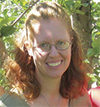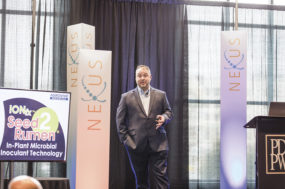I am proud to say I have been a Wisconsin Farm Bureau member for 15 years, and in those 15 years I have heard many times about using grassroots efforts to make a difference in policy. This past year, for the first time, there was something in our state policy I wanted changed. With a little research and help from fellow members, I was able to pull together people who thought the same as I did to pass a policy amendment changing the current state policy.
Some might consider the policy I wanted changed to be small, but to me it was a big deal. Wisconsin Farm Bureau policy used to state: “Since technical colleges are funded by a tax levy, we support having technical college boards elected.”
This is not the current process in place and, in my opinion, not favorable of encouraging farmers to serve on their local technical college’s board. I proposed we strike that policy and change it to: “We support the current method in place by the Wisconsin Technical College board to appoint members to technical college boards.” This policy change did not happen overnight.
First, the president of the technical college where I teach brought the policy wording to my attention and encouraged me to change it. Research was then started on how to go about changing policy and on understanding the current method so I could defend it. Next, I had to put together the exact wording of the new policy I wanted. That policy had to be put into a resolution that then had to be put to a vote at our county annual meeting.
Once the county members supported the resolution, it was forwarded to our state policy development committee. That group of individuals looked at more than 500 resolutions submitted from across the state to determine which ones should be in the proposed 2016 policy book. After I found out my policy change did not make the cut, there was one more option.
Because the resolution passed at the county level, I had the option to bring it up on the floor in front of 400-plus delegates from across the state at our state annual meeting. In order to feel comfortable bringing this forth, I felt it was necessary to rally support from other members. I reached out to another county, which had passed a similar resolution at the county level, and to a fellow agriculture instructor at a different technical college.
Together, we all spoke in favor of the change and rallied others we knew to vote in favor of the policy change. When the morning of the meeting arrived, I was nervous. The time came; I stepped up to the microphone, made my motion and gave my reasoning. The chair called for a vote and, with a unanimous vote, my resolution passed. Just like that, using the grassroots effort Farm Bureau is known for, I was able to make a difference.
I share my story with the hope of encouraging others to get involved with policy development related to agriculture. People often say they agvocate to the consumer because they want to be the ones telling their story. The same is true when it comes to policy development. Farmers need to stand up and make sure regulations are not being passed by people who don’t understand where their food comes from.
You are probably thinking there is no way you would get up and talk like I did. That’s perfectly understandable. The Farm Bureau and many other agriculture lobbying groups have a way to share your story without talking. Websites often include information about legislative action. With the simple click of a mouse, you can connect with your senator or representative to voice your opinion.
Maybe, at a meeting, you might be asked to sign a letter the organization is mass-mailing to the government to show the numbers for or against a certain policy. I encourage you to take the time to get involved with supporting the actions of whichever farm lobbying group best fits your beliefs. Together, using grassroots efforts, we can make sure regulations and laws in the future are developed by hearing all sides of the story. PD
Christina Winch is a dairy farmer in Fennimore, Wisconsin. Email Christina Winch.




